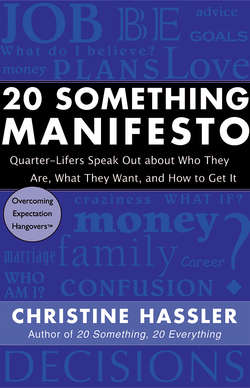Читать книгу 20 Something Manifesto - Christine Hassler - Страница 47
На сайте Литреса книга снята с продажи.
PARDON MY DUST: UNDER CONSTRUCTION
ОглавлениеGrowing up, we are classified and distinguished by our gender, hobbies, academic interests, socioeconomic status, and so on. From elementary school onward, our abilities and activities are the stuff of dinner conversations, and our characteristics and interests often collect into an easily recognized type or “brand.” Perhaps you were the funny hyperactive performer, or the easygoing athletic friend, or the introverted grade-A student. In the Basic stage, our labels are usually still stuck to us; although we may begin to feel the urge to pull them off, we aren’t quite sure how yet.
“It’s hard to separate myself from my parents’ reassurance of who I am. Even though I am independent, I still seek their approval and opinion.”
Medical school student, 24, serious relationship, Michigan
We’ve come to rely on our “brand,” no matter how badly it may seem to fit or how much we dislike it. It’s the basis for the approval and feedback we’ve always gotten from our parents, teachers, and peers. When we describe ourselves, we may continue to regurgitate this external feedback, reinforcing it at the very same time that we may want to undo it. Growing up, intelligence was my most externally reinforced characteristic, so I was always either “smart” (positive) or “a goody-goody/nerd” (negative).
During the Basic stage, it’s common to experience a lot of confusion and self-doubt. We tend to engage in a lot of comparison with others, and more than ever our self-worth or confidence may rise or fall based on what others think. We pursue compliments like candy, while criticism is hard to handle, making us defensive on the outside and very upset on the inside. It can be hard to distinguish our authentic self from our “brand,” and to reconcile our “good” attributes (those that earn praise) with our “bad” (those that are criticized or considered weak). Twenty somethings can get caught up in a duality of thinking that is hard to shake. In some contexts, “smart” is good, but in others it’s bad — and so we end up loving and hating being “smart” at the same time. Society doesn’t help. For instance, when job hunting, we are constantly being asked, “What are your strengths and weaknesses? Tell me about your accomplishments.” Since we are supposed to “accentuate the positive,” we hide, judge, and shame the things we don’t like about ourselves, hoping we can either change them, hide them, or eventually grow out of them.
